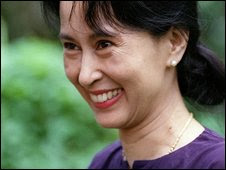
Global think-tanks are ignoring the fact that nothing is free or fair in the junta-ruled country, least of all ballots
Most people are saying "at least it's better than nothing", in reference to the upcoming elections in Burma. This is especially true for those who are desperate to see some progress in the junta-ruled country.
The latest briefing from the International Crisis Group gave the impression that the election, despite the international community pointing out all the faults with it, would serve as "the best opportunity in a generation to influence the future direction of the country".
With such an endorsement, even though a mild one by international standards, the junta leaders in Rangoon will end up having the last laugh. Persistence and complete control is a virtue these days because stability and the status quo are easy to deal with.
Political turmoil in Thailand has added fuel to the international community's growing anxiety about democratic development in the region. Many scholars tend to view countries with continuous political stability as preferred models of development and investment.
The Thai situation was repeatedly used to demonstrate one salient point - stability is linked to prosperity. If one wants prosperity then one must forget about freedom and democracy. Thailand wants both, so the experiment and healing continues.
What is sad about the the international community and most independent think-tanks is that they are not really serious about the suffering of the Burmese people.
For 20 years, the Burmese people have been living under the military junta, tightly monitored and suppressed. And yet, the international community is slow in taking collective action. Investments from the West, dubious positions and awkward neighbourly policies by China, India, as well as Asean, have only strengthened the regime.
Why should the junta accommodate calls for fairness and justice?
The Burmese generals know full well that international focus is short-lived, as there are a myriad global issues to pay attention to. The current Korean Peninsula crisis will continue to dominate the headlines. It would not be a surprise if the junta suddenly declared the date of polls now that global attention has shifted away to the northeast of Asia.
The ICG's claim that the voting in Burma could be "relatively fair" is preposterous. Yet, such belief is proliferating. That is exactly what the junta wants to see, and that explains why dictatorial governments around the world no longer succumb to any international pressure.
The ICG has not asked if the voters are free to cast their ballots with free will.
How can voters cast their ballots freely if they are being controlled and watched by plain-clothes police officers and thousands of spies in the neighbourhood? They are scared to hell. Every name and household has been scrutinised and put in the records.
The people know that what they do at the polling stations will come back to haunt them. The atmosphere of fear is rising every day.
It is naïve to think that the 1990 poll victory by the opposition party may take place once again because the Burmese voters will be prepared to reject the junta en masse. Similarly, the junta leaders are prepared to make sure they win the polls, now that they've learned from past mistakes.
Indeed, if the ICG continues believing what it does, the regime has already won the election!
Editorial, The Nation, Bangkok
No comments:
Post a Comment